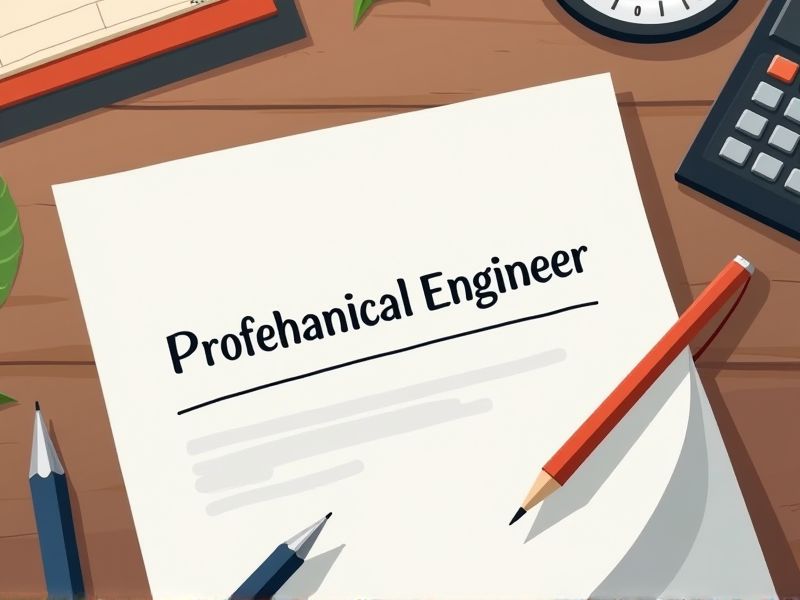
Professional Mechanical Engineers often require specific certifications to validate their expertise in specialized areas and enhance their career prospects. Certification can act as proof of proficiency, adherence to industry standards, and commitment to ongoing professional development. These credentials are crucial in gaining credibility with employers and clients, as they demonstrate a reliable grasp of essential engineering principles and practices. Here are some important certifications you may need to pursue in the field of Professional Mechanical Engineering.
Fundamentals of Engineering (FE) Certification
Earning the FE certification is often the first step toward becoming a licensed professional engineer, required for career progression in engineering roles. The certification demonstrates an understanding of engineering principles, which increases professional credibility and marketability. Many employers require engineers to have this credential to confirm their technical proficiency and commitment to the profession. Holding the FE certification is also a legal requirement in many regions, ensuring that practicing engineers meet standardized qualifications.
Professional Engineer (PE) License (Mechanical)
Securing a Professional Engineer (PE) license in mechanical engineering often provides credibility, as it demonstrates a recognized standard of competence and ethics within the industry. This credential frequently results in greater career opportunities and advancement, as many employers and clients may prefer, or sometimes require, PEs for leadership roles and project accountability. With a PE license, an engineer usually gains the legal authority to approve designs and oversee the engineering work of others, which is critical in ensuring safety and compliance with regulations. Holding a PE license often means qualifying for higher levels of professional responsibility and trust, which often translates into increased earning potential over time.
Certified Professional in Engineering Management (CPEM)
Obtaining the Certified Professional in Engineering Management (CPEM) credential enhances a mechanical engineer's ability to effectively integrate technical expertise with leadership skills. This certification provides engineers with a structured understanding of project management principles and financial acumen, critical for advancing in managerial roles. As industries demand engineers who can bridge the gap between engineering and management, possessing a CPEM demonstrates a commitment to continuous professional development and adaptability. With a growing emphasis on interdisciplinary teams, the certification equips engineers to better navigate and lead complex projects.
Certified Energy Manager (CEM)
Mechanical engineers often seek CEM certification to enhance their knowledge of energy-efficient systems. This certification provides them with the ability to identify energy-saving opportunities in complex mechanical systems. As energy costs rise and regulations become more stringent, having a CEM allows these engineers to implement effective energy management strategies. The credential signals to employers and clients that the engineer is committed to sustainable practices, increasing their competitiveness in the job market.
Six Sigma Black Belt Certification
The Six Sigma Black Belt Certification equips professional mechanical engineers with advanced problem-solving skills, leading to improved process efficiency. This certification fosters a deep understanding of data-driven decision-making, crucial for complex engineering scenarios. Professionals with this credential often lead projects that significantly reduce costs and enhance product quality. Holding this certification can increase job prospects and position engineers for leadership roles in their organizations.
Project Management Professional (PMP)
Professional Mechanical Engineers often work on complex projects that require coordination across multiple teams. With PMP certification, they enhance their skills in managing project timelines, budgets, and resources effectively. This expertise leads to improved project outcomes, reducing risks of delay and cost overruns. Employers value these skills, making PMP-certified engineers more competitive in the job market.
ASME Boiler and Pressure Vessel Inspector Certification
The ASME Boiler and Pressure Vessel Inspector Certification ensures that a Professional Mechanical Engineer possesses in-depth knowledge of safety standards and regulations. Achieving this certification leads to a reduction in the likelihood of equipment failure and accidents, promoting workplace safety. The certification enhances an engineer's credibility and broadens career opportunities within industries that depend heavily on pressure vessel systems. Compliance with ASME standards often becomes mandatory for international projects, so certification ensures global professional alignment.
Certified Reliability Engineer (CRE)
A Certified Reliability Engineer (CRE) enhances a Professional Mechanical Engineer's capability to develop systems that reduce downtime and maintenance costs, leading to improved efficiency. By incorporating reliability engineering principles, a Mechanical Engineer can ensure product durability and optimize lifecycle performance, which increases consumer satisfaction and trust. The CRE certification equips engineers with the skills to conduct thorough failure analysis and risk assessments, often demanded in complex projects. Employers value engineers with CRE accreditation because they possess the ability to implement processes that improve product design and prevent costly engineering oversights.
LEED Accredited Professional (LEED AP)
Having a LEED Accredited Professional (LEED AP) enhances a mechanical engineer's ability to design energy-efficient systems that align with sustainable standards. The certification indicates a comprehensive understanding of green building principles, which can improve project outcomes in terms of reducing environmental impact. Achieving LEED AP status often leads to increased project opportunities, as many clients seek professionals with proven expertise in sustainable design. Knowledge of LEED standards also equips mechanical engineers to contribute to the certification process of buildings, thereby adding value to projects aiming for LEED certification.
Certified Manufacturing Engineer (CMfgE)
Certified Manufacturing Engineers (CMfgE) bring specialized expertise in improving production processes, which enhances efficiency and quality in mechanical engineering projects. This certification ensures that mechanical engineers are equipped with the latest industry practices and technologies vital for innovation and problem-solving. Organizations benefit from employing CMfgEs due to their ability to reduce costs and optimize resource allocation. The certification also elevates a professional's career prospects, reflecting a commitment to continual learning and expertise in manufacturing engineering.
Summary
By obtaining certifications, you enhance your credibility and job prospects in the mechanical engineering field. Your earning potential may increase as certifications often lead to higher salary offers. Employers are likely to view you as a committed and knowledgeable professional, increasing your chances of career advancement. Certified skills can also expand your technical expertise, allowing you to tackle more complex projects.
